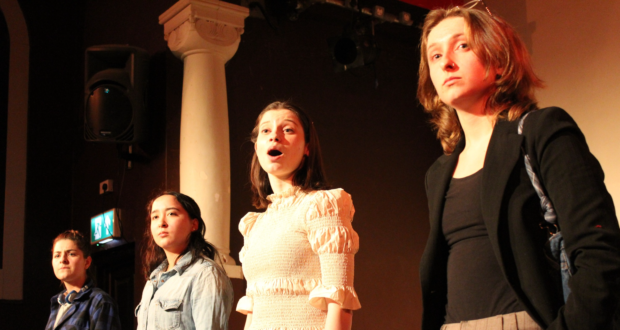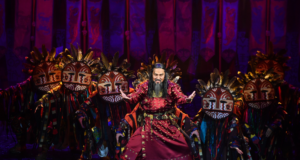Show by show reviews for Act II Festival
You can read the main review of the Act II Festival here. Below you will find the 12 individual reviews for each show featured. These are given in the running order of the day.
The Startup
★★★
Introduced as the HSRG Fresh Starter Competition, Dhanush Giridhar‘s The Startup gets us off to a solid start. After Brooke Agius’ Judge sets the scene in a strong opening speech, the three entrepreneurs (Caroline Letelier, Lauren Owen and Olivia Steele) begin to pitch their business ideas.
This pitch scene is wonderfully directed by Dominika Ucar, with the three circling each other like gladiators, fighting for the centre of the stage, jumping in whenever there is an opening to push their opponent out of the spotlight. Pitches complete, we then watch them talking together as they await the announcement of who has won, and it’s here we learn a little more about each and their motivations for entering the competition. This makes for a solid structure as we progress smoothly through each scene.
The narrative would benefit from introducing us much earlier to its central theme of work visa issues and the right to remain in the UK, as this would allow us to better understand what the play wants to say. But the strong directing style and fine performances still make this a good short that more than holds its own, and one that could clearly be built upon.
Written by: Dhanush Giridhar
Directed by: Dominika Ucar
The Sands of Perpetual Longing and Mutual Dissatisfaction
★★
Young couple Robin and Spencer (Madelyn Morgan and Louisa Naiyera) are stranded in the desert and find themselves talking about their lives, their relationship and their hopes for the future. Of course, this brings up old wounds and lingering resentment between them.
Structurally there is a lot to admire, with the use of flashbacks smoothly introduced, and the flow never being interrupted as they easily traverse between scenes. However, it is a struggle to clearly hear dialogue because of low volume, which in turn causes a disconnect and loss of understanding. Had I read the show blurb in advance, I’d have realised they are stranded due to being robbed and left here, which may have helped clarify the situation, but advance reading should not be a pre-requisite of being able to follow a show: that is the writer’s job, to lead us there. So I found myself scratching my head a little trying to grasp the how and the why, and never really made a connection because of it.
There are some nice touches that do add soft humour: the production of limes from pockets is a wonderful little scene that has the audience chuckling. But it’s not quite enough, making this a short that passed me by without making any great impact.
Written by: Sunny Cheong
Directed by: Peter Smart
Lavender
★★★★
What immediately makes Lavender stand out is that it is clearly set in a very different era to everything else on offer today. The rather formal speech and vocabulary instantly transports us into the past, with a Victorian feel to it all. It’s a credit to Isaac Banjoko’s writing combined with Demir Timuray’s direction that this is so instantly clear, allowing us to be comfortable with what follows.
We first meet the Webber family, where father and mother (Rubayet Al Sharif and Mia O’Gorman) are dismayed at the damage to the family name their son Robert (Joe Devitt) is causing, having been witnessed “walking with men”. To protect their reputation they arrange to marry him off to the daughter of the Windsor family (Jemica Taylor, Cleo Donnials and Thomas Lafferty), who are equally as formal and concerned about their family name. They at least do not have any concerns about the good repute their daughter has. Except the daughter has her own secrets; ones which are better kept than Robert’s. The whole piece pivots superbly around one scene between son and daughter where they share their secrets and agree on the convenience of the marriage for both.
The play leaves the audience with plenty to ponder as the two families happily celebrate their good fortune in bringing their children together. Even set in the past, there are clear nods to the present regarding sexual attitudes, and how at times people are still forced to suppress their true nature. This is another play that feels as if it could so easily be extended to an hour and allow its themes to be even further explored.
Written by: Isaac Banjoko
Directed by: Demir Timuray
Breathe
★★★★
“I didn’t think my rape would look like this” is a powerful opening line and one that demands a strong follow up. And that is exactly what we get from Breathe. Because that line is followed by a beautifully haunting choreographed scene as we watch the events preceding Lisa’s rape by Aby. It’s an incredible moment that says everything it needs to say without a single word being spoken.
Roxanne Delreux‘s central performance is absolutely mesmerising as she attempts to comprehend what happened, almost convincing herself it was her own fault. She is more than ably supported by Elena Lushaku and Hermela Michael who help keep our attention throughout.
The play takes an unexpected turn when Michael reappears to ask us to vote on where the play goes from there. At first this feels crass and out of place, but then I realise it has forced us to take responsibility for what has happened, taking us from mere spectators to enablers, because “silence isn’t a yes”. I’d suggest that this needs a little reworking to stop it being so jarring in the way it is introduced and helping engage the audience more fully, but even in its current format it lifts this play up even further.
Breathe tackles the very relevant topic of consent and how blurred the lines can be, made all the clearer by closing monologues that force us again to think about our own actions, or the lack of.
This is a truly fantastic short play that could easily be developed and presented in a longer format. It would more than hold its own as a standalone show and I genuinely hope that it does just that in the future.
Written by: Laure Bacchiocchi
Directed by: Jasmine Silk
The Other Side
★★★
Happy couple Evelyn and Freya’s world is destroyed when Freya is murdered by Tristan, a man clearly suffering from severe mental health issues; something that is introduced but then totally forgotten afterwards. We are left to witness how Evelyn manages the grief and loss, wondering if her life will ever be whole again and how you can possibly move on from such an event.
It’s a promising premise and in places hints at what it could become with more work. But in this short play format it fails to really scratch beneath the surface, leaving us yearning for a little more depth. Too much time is spent creating the concept without following its ideas through. Both Evelyn’s grief and Tristan’s mental health are left underdeveloped.
There also needs to be better consideration of sightlines. Too much happens at a low level, with actors sitting on the floor. This leaves anyone more than two rows back with little chance to actually see the action. It’s a shame, because when we do there are some strong performances, predominantly from grief-stricken Andy Mackinnon and Tilly Wood, whose optimism at life even when hers is about to end is moving.
The lighting design is considered, used to set moods quite specifically; the greyness that follows Tristan (Benjamin Sumrie) is especially noteworthy. Equally, the use of voiceovers as we hear messages left by Evelyn for Freya after her death also shows promise that there could be more to this play if it were further developed.
The Other Side feels very much a piece that struggles with the short run time. Hopefully it would build on its ideas more successfully if given longer.
Writtenby Chloe Moore
Directed by Lenard Kelemen
Bliss Cafe
★★
Two fathers sit in a cafe lamenting that their daughters are in a queer relationship. Their bigotry and narrow-mindedness is clear to see. Around them the restaurant staff listen in and pass their own comments on the two and their views, which they feel should be a thing of the past.
It’s a clever framing device that allows for differing attitudes to be clearly presented. But it’s let down by trying to cram way too much content into the short twenty minute running time. The action occasionally falls (it would seem deliberately) into farce, which feels encouraged by the use of an actor at the rear of the room being the voice on the other end of phone calls, but sounding more like a yapping dog. Sometimes what looks clever and funny on paper is less so when it reaches the stage, it just feels amateur.
The writing does show lots of promise, with sections of the play hitting their target precisely. This is especially clear during one conversation between a father and one of the waitresses, where for a brief moment there seems common ground. More of this would do this play wonders.
At other times it needs reigning in to just tighten everything up. It feels cluttered and messy in some of the more manic moments, struggling to decide quite what it wants to be: is it farce or serious commentary? The former drowns out the latter just a little too much.
The closing monologue, however, is well-crafted in expressing the play’s thoughts, demonstrating that it could work so well without falling too often into farce.
Written by: Younes Dine
Directed by: Sam Smith
While the World Goes Under
★★★
There are lots of interesting ideas at play within While the World Goes Under, which makes for a lovely, thoughtful twenty minutes.
A and B (Elly Wilson and Charlotte Kindred) are a couple appearing to be in a strong relationship. But all is not as smooth as it first appears. They are clearly from different backgrounds with very different views on life. One is full of hope and belief, the other less so, instead full of doom at how we are slowly drowning under the mess we are creating. Or maybe more precisely the mess ‘they’ are creating. It’s not helped by her drinking either, when she may reveal what she really thinks with no recollection of doing so the next day.
The narrative would certainly benefit from more focus, as what begins with a rant about the upper classes who run the world being useless later turns into a piece about whether it is right to bring a new life into a messed up world.
Everything the play touches upon has plenty of mileage and it does make for some interesting dialogue. The real issue is that it struggles to tie all its thoughts together. However, it shows great promise that in a longer format it would better explore them.
Written by: Rosie Pierce
Directed by: Anya Anderson Birch
The Art of Doing Nothing
★★★
Being told the lump in your breast is not cancer should be great news. But not for Reena, who had somehow told herself that if she was going to die it would at least allow her to actually live for a brief time. Instead, knowing her life will go on leaves her feeling disappointed and questioning what her existence really is right now.
This is the only one person piece in the festival and Leah Omonya completely nails it. It’s one of the day’s real stand-out performances as she holds our attention alone on stage for twenty minutes. She’s ably assisted by good direction when transitioning between scenes and well-considered lighting to effectively create different atmospheres.
The writing goes astray a little when discussing issues of the overseas charity Reena finds herself volunteering with hitting political difficulties, and you do wonder what the aim of this ultimately is. But it’s on much stronger ground when it returns to its core theme of the meaning of life and whether a high paying job and material possessions are really enough to give us purpose and fulfillment.
This is a wonderful performance with plenty to say with its writing. With a little editing to keep it on track it could be even better.
Written by Reshmi Mohan
Directed by Maisie Allen
New Horizons
★★★
A family moves back to their homeland from London after their father goes missing. It all seems rather normal, except that one of the three sisters, Nashira (Simran Oodit), is a ghost that only they and family friend Sahil (Ahmed Aamir) can see. Sahil soon confesses that he believes he is cursed and the cause of the death of those close to him, having seen them taken by a ghostly figure each time.
Whilst this is a fun little ghost story with a wonderful air of mystique, it does suffer with its delivery. Volume levels are a little low from the cast, and some of the gentler moments are lost under the background noise around the theatre. It is a shame, but a problem that could be resolved easily enough.
Add in some tightening of the story, such as what happened to their father, which currently feels a rather loose thread, and we would be left with a piece that would fit very well into the London Horror Festival should it return later this year. I’d certainly go back to see it again if so.
Written by: Supravo Rahman
Directed by: Annalena Lipinski
Queer Switch
★★★
Clive and Rodger (Aymeric Etogo and Yusuf Naya) are two very different people. Rodger is, as he makes clear to us all, a man’s man, and his pronouns are absolutely he/him. Clive on the other hand is queer and a person Rodger clearly has no time for. But here they are, stuck in a strange escape room and the only way out is to come to a mutual understanding.
The mystery is nicely built upon by Lilly Walker’s Seeker, who introduces us to the room, and then does some old fashioned body swapping to transpose each man into the other’s place so they can better understand one another, as well as allowing their dark secrets to be revealed.
The play suffers from a lack of clear diction, due in part to how each actor attempts to play Clive in the soft tones required, but leave him way too quiet. That issue aside, both handle playing each role well, and given how different they are that is quite the feat.
Queer Switch takes on strong subjects in a fun and interesting way, with an ending that nicely wraps it all up. It’s a concise piece that makes good use of its run time without ever feeling rushed.
Written by: Santiago Guerra
Directly by: Mya Onwugbonu
Strangers
★★★★
Strangers takes us through a year with four individuals. Whilst their lives constantly cross paths they remain very much as strangers to one another. It’s a clever analogy of London-living, each character always too busy with their own life to really connect with others.
Meghan Mabli, Jennah Finnegan, Maria-Vittoria Albertini Petroni and Eve Wilson more than do justice to a sharp and fast-paced script. Dialogue moves quickly between all four. Scenes are connected by speeches given by all of them at once, sentences passed from one mouth to the next, with the vital moments spoken in unison. It’s all deftly held together with great directing by Lucy Millett.
In-between these moments, pairs are brought together, allowing us to find out more about their normal London lives, their dreams, their worries; allowing opportunities when a connection could be made if only one or another would make the effort. And yet they consistently fail. That is, until a moment of tragedy somehow unites them all.
This four-hander is another amazing standout play of the day. Nell Rayner’s writing really reminds me of James Lewis’ work in its study of contemporary and everyday lives. It takes the mundane and makes it interesting. It seriously would not feel out of place on the stage at the Lion and Unicorn Theatre (if you’re reading this David Brady – L and U’s Artistic Director – sign this one up).
Written by: Nell Rayner
Directed by: Lucy Millett
Woman. Life. Freedom.
★★★
Set around the Qatar World Cup when England faced Iran, Woman. Life. Freedom. explores the wearing of the hijab. It was inspired by the protests that rocked Iran following the murder of Mahsa Amini in police custody, accused of having an “improper hijab”.
London school teacher Meera (Alicia Fernandes) decides to make her own stand by removing the hijab she has worn for a decade, much to the shock of her family. This is a nuanced piece of writing that makes it clear that wearing a hijab should be a woman’s choice and not imposed upon her.
Fernandes holds the piece together well, giving a powerful central performance whilst allowing the supporting cast space to work around her. The decision to have the father as a voiceover is perhaps not the wisest one. The father plays a vital role in the debate, yet by being pre-recorded those scenes are left slightly stiff in nature, with the cast needing to respond to a detached recording. But it’s an issue that would not be difficult to resolve.
The play fits well within its twenty minutes but is another that feels ripe for development into a fuller hour. This is certainly a topic that deserves to be given much more attention.
Written by: Tarah McDermott
Directed by: Clara Janssen
 Everything Theatre Reviews, interviews and news for theatre lovers, London and beyond
Everything Theatre Reviews, interviews and news for theatre lovers, London and beyond




3 comments
Pingback: Review: Act II Festival, The Space - Everything Theatre
Pingback: Review: Act II Festival, The Space - showbizztoday
Pingback: Interview: Making Friends with Strangers - Everything Theatre